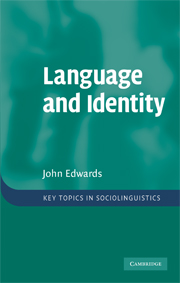Book contents
- Frontmatter
- Contents
- 1 Introduction
- 2 Identity, the individual and the group
- 3 Identifying ourselves
- 4 Language, dialect and identity
- 5 Dialect and identity: beyond standard and nonstandard
- 6 Language, religion and identity
- 7 Language, gender and identity
- 8 Ethnicity and nationalism
- 9 Assessments of nationalism
- 10 Language and nationalism
- 11 Language planning and language ecology
- Glossary
- Notes
- References
- Index
- References
3 - Identifying ourselves
Published online by Cambridge University Press: 05 June 2012
- Frontmatter
- Contents
- 1 Introduction
- 2 Identity, the individual and the group
- 3 Identifying ourselves
- 4 Language, dialect and identity
- 5 Dialect and identity: beyond standard and nonstandard
- 6 Language, religion and identity
- 7 Language, gender and identity
- 8 Ethnicity and nationalism
- 9 Assessments of nationalism
- 10 Language and nationalism
- 11 Language planning and language ecology
- Glossary
- Notes
- References
- Index
- References
Summary
PERSONAL NAMES
There is a large literature demonstrating that all manner of individual and group ‘markings’ can have important consequences for interpersonal judgements. Skin colour, sex/gender and physical attractiveness are immediately obvious here. Social psychological studies have shown, for example, that attractive people may be viewed as less culpable in crime scenarios – unless the alleged crime was one in which attractiveness might have facilitated the offence, in which case judgements may be harsher than those made of less physically appealing individuals. Attractive children may receive more attention and better marks from their teachers. Physical variations often elicit stereotypic perceptions – and we are always sensitive to the perceptions of others, particularly where these have some consistency over time and context. If everyone assumes that, because you are short and fat, you must have certain personality traits, then you may very well come to develop them. In general, there is no shortage of evidence, both anecdotal and formal, that ‘involuntary’ markers of who we are, what we look like, and what groups we belong to are related to social possibilities and circumstances.
Less ‘involuntary’ identifiers are also important. Among these are religious affiliations, language-group memberships – and names. Different names have different connotations: some are perceived as much more attractive than others, and those to whom they belong may expect different types of treatment from peers, teachers and bosses. A small example was provided in an honours thesis conducted at my university (MacEachern, 1988).
- Type
- Chapter
- Information
- Language and IdentityAn introduction, pp. 34 - 52Publisher: Cambridge University PressPrint publication year: 2009



